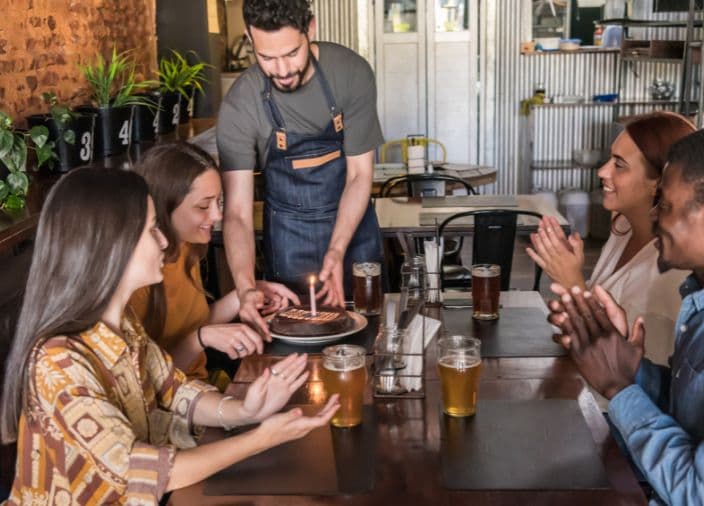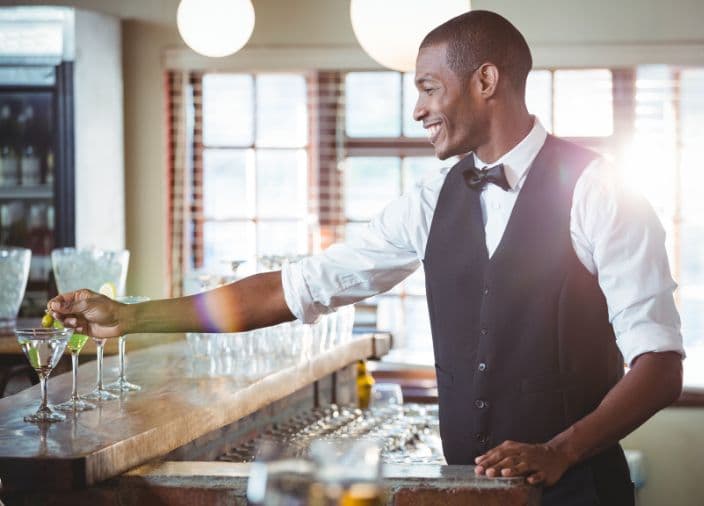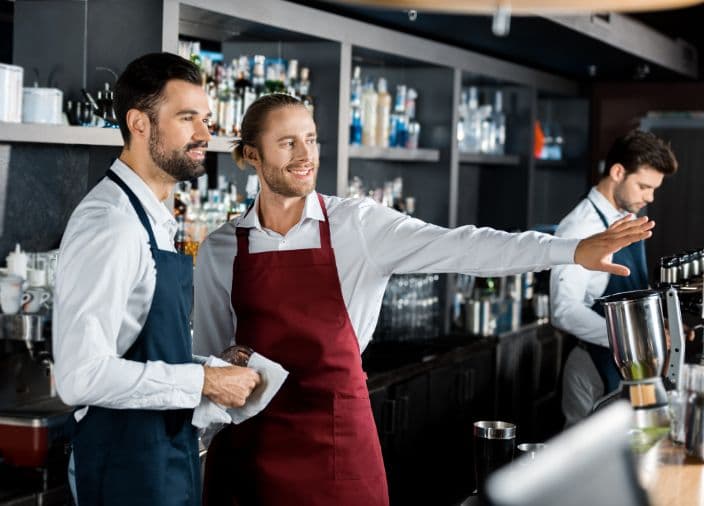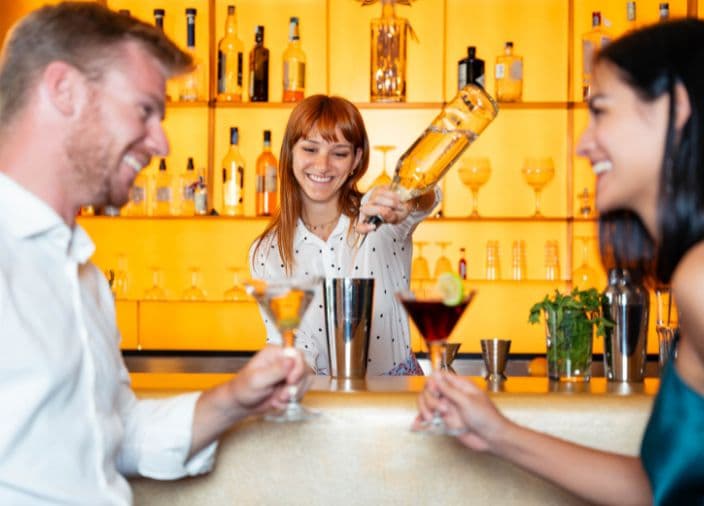Bar Skills: How To Deliver Great Hospitality
Great hospitality is about going above and beyond for our guests and building instant rapport based on fantastic communication. Communication is one of the most vital elements of being a great host. As hosts, we can turn good experiences into great ones. Being willing to ‘serve’ and learning the power of empathy will help us deliver a superior guest experience.
Estimated reading time: 5 minutes

The importance of great hospitality
In the age of celebrity chefs, bartenders, and television shows featuring the world’s best bars and restaurants, hospitality is at the forefront of the general public’s psyche. With that, guest expectations of how they are treated in a venue and their general understanding of food and drink are on the rise. They’re not just content with having a great drink. They are looking for unique experiences that will be something that they can share with their friends on social media and talk about for years to come.
By developing strong communication skills, mastering empathy, being aware of your guests’ wants and needs, and implementing robust service recovery protocols, you can deliver great hospitality and a superior guest experience.
Delivering great hospitality and a superior guest experience
Great hospitality is about going above and beyond for our guests and building instant rapport based on fantastic communication. Communication is one of the most vital elements of being a great host. As hosts, we can turn good experiences into great ones. Being willing to ‘serve’ and learning the power of empathy will help us deliver a superior guest experience.
The two most important points of contact for a guest are when they enter your business, and when they leave... a warm welcome at the door, and a gracious good-bye, either before or after asking about their experience, are two of the most effective ways to ensure that your guests feel acknowledged and recognised for their patronage
Jim Meehan's Bartender Manual, 2017

CREATING A GREAT FIRST AND LAST IMPRESSION
There are many different methods to break the ice with your guests and make a great first impression; these can be overt verbal or subtle, non-verbal interactions.
For Example:
Non-Verbal - At Bar High Five, Tokyo, Higetsugo Ueno presents a warm towel (known in Japan as an oshibori) to freshen up. “This is a warm towel for a warm welcome” is the simple line he uses to greet his guests. He believes that we do not need words to break the ice. “All you need to do is to show your honest smile”.
Verbal - Stefano Catino is from Italy and has a strong Italian accent. At his bar, Maybe Sammy in Sydney, he harnesses his accent - something that could be seen as a disadvantage - and uses it to his advantage. “I use my Italian accent to disarm my guests and try to engage them to see what they are up to: dinner, drinks, or their plans,” he explains. “I love to ask people if they have been in my venue before or if it’s the first time so that I know how to plan my style,” Stefano adds.
Strong openers and all important closers
Breaking the ice, making a solid first impression, and opening the lines of communication with the guest are signs of warm hospitality and generosity. Try and do it immediately, as soon as your guest sits down and begins to look over the menu.
A strong finish is just as important as a guest’s first impression. The final moments of a guest visit are freshest in their memory as they leave your business. These moments allow you to leave guests with a warm, positive, and lasting impression. A sincere and authentic goodbye creates an emotional connection with your guests. When they feel genuinely valued and appreciated when they depart, they are likelier to feel a sense of loyalty, return and recommend your business.
GREAT HOSPITALITY
The cornerstone of hospitality is the fundamental compulsion to make others happy. It can be evident in a bar or restaurant, someone’s home, or even a hair salon. Michaël Engelmann, a Master Sommelier based in New York, says, “When my hairdresser can remember what we talked about last time and asks me how it was (a dinner, show, weekend away...) - that is hospitality.
“She listens, she cares, and makes me feel good. It doesn’t cost anything,” he adds. One of the most basic examples of hospitality in making others happy is how we might talk to a guest about a Dry Martini. If a guest orders a Dry Martini, only for their server to say “sure” and make them a Dry Martini, they receive only the most basic service.
A cocktail vending machine or a robot could provide this service. The guest gets their Dry Martini, but is it truly ‘theirs’? If, instead, their server opens a dialogue and asks a series of questions to elicit more information, this is the moment that they begin to provide “hospitality”:
“Would you like a gin or vodka Martini?”
“Which brand of gin or vodka do you prefer?”
“How dry would you like it?”
“Would you like olives or a twist as a garnish?”
This process of engaging a guest in conversation to better understand their wants and needs and then tailoring your responses, behaviour and recommendations accordingly is where service morphs into great hospitality.
You can’t take a ‘one size fits all’ approach to hospitality; it has to be adapted based on cues from the guest.
- Open the dialogue
- Learn what you can about the guest
- Cater to their requirements and adapt your hospitality style accordingly

CATERING TO OUR GUESTS NEEDS
We can use many cues to assess what our guests expect from their visit; we should take note of these and strive to exceed those expectations. This is what catering for our guests is all about: exceeding their expectations rather than just meeting. The first step is reading your guests to establish why they’ve chosen your establishment and what sort of experience they want.
Once we’ve read our guests and understand what they’re looking for - beyond simply a beverage or a plate of food - we can work on the ‘little things’ that can elevate their experience, make it memorable, and exceed their expectations.
- The table celebrating a birthday: The host or server needs to quickly establish whose birthday it is as soon as they arrive and communicate this to the whole team. Throughout the night, small flourishes of generosity - some champagne to start, a little taster of a cocktail, a small birthday cake sent with compliments from the kitchen - all these little additions go a long way to making their night memorable and increase the likelihood of them becoming return customers.
- For your regulars: Remember their favourite drink. Looking after these guests by remembering their drinks and names is a sure way of developing a connection with them and exceeding their expectations.

SERVICE RECOVERY
Not every service goes perfectly to plan; sometimes, kitchen, bar, or floor errors can upset a guest. These situations have the potential to ruin the guest’s experience. It’s important to utilise each interaction with a guest throughout their visit to sense how their experience is developing.
You can intervene and begin service recovery as soon as you identify an issue causing distress. Often, our guests are too polite to mention something that has upset them, but as servers, you can sense the change in their mood. It’s at times like these that we need to be proactive.
For example, a simple question, “How are you finding your drinks?” can generate a negative response, but we can meet that with a positive reaction. Immediately offering to replace the drink a guest isn’t enjoying can turn their negative experience into a positive one, leaving them impressed with your professionalism and hospitality. With the possibility of negative online reviews, it’s vitally important to make sure that every guest walks out the door having had a fantastic experience in your venue.
Sometimes, these moments of ‘Service Recovery’ can be the defining factor of the guest experience, and the mistake will barely remain a memory.
Treat people as individuals. The more you do this, the more you're able to find an appropriate solution. I never think the problem is the issue, but how it's dealt with. Some people respond well to a free something, others just want to be heard.
Ryan Chetiyawardana (AKA Mr Lyan)
Key Takeaways
- Great hospitality is about going above and beyond for our guests and building instant rapport based on fantastic communication.
- Making a solid first impression and opening the lines of communication with the guest is a sign of warm hospitality and generosity.
- A strong finish to our guests’ experience is just as important as their first impression.
- Catering for our guests’ needs is about exceeding rather than just meeting their expectations.
- Service recovery involves proactively identifying and responding to a disrupted guest experience to turn a negative experience into a positive one.
